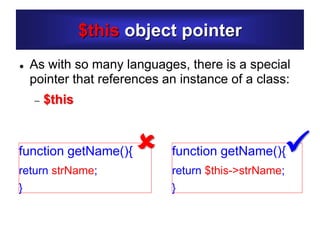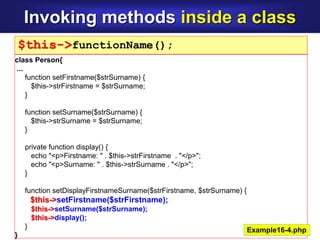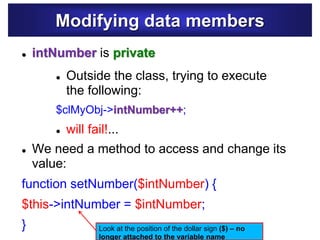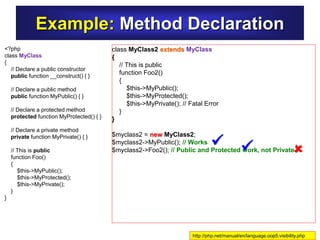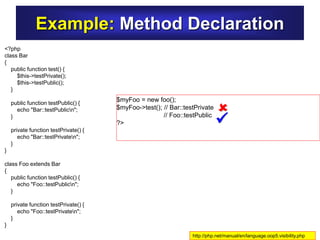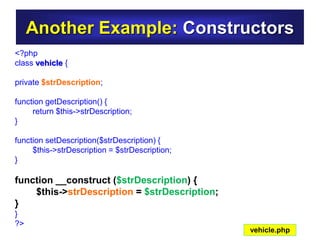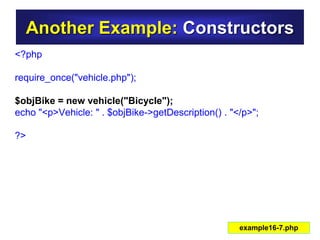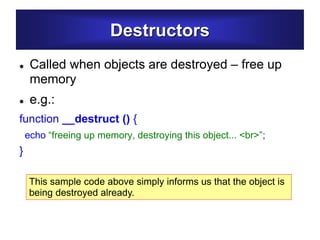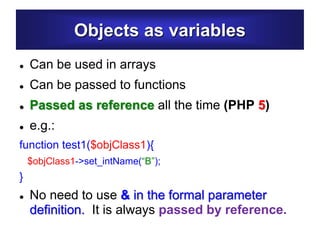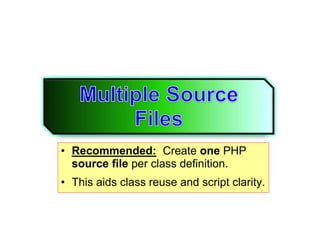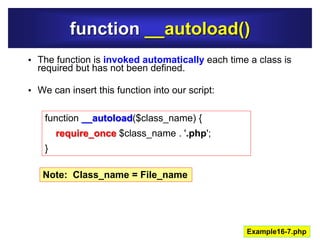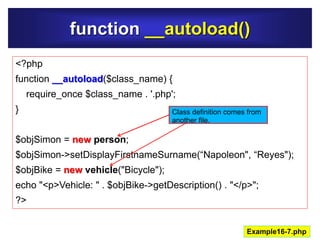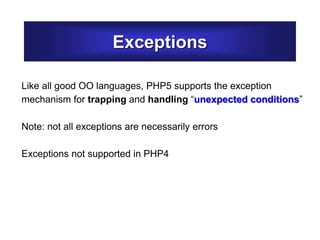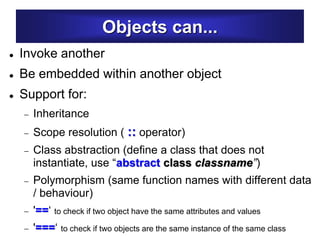Lecture 17 - PHP-Object-Orientation.pptx
- 3. • Data members • Methods
- 4. Object Orientation PHP is an Object-Oriented programming language Fundamental feature of OO is the class PHP classes support Encapsulation Inheritance Polymorphism
- 6. What is a Class? Classes Sophisticated ‘variable types’ Data variables (data members) and functions (methods) are wrapped up in a class. Collectively, data members and methods are referred to as class members. An instance of a class is known as an object. //defining a new class named Robot class Robot { //place class members here... }
- 8. Instantiating a class using new Once a class has been created, any number of object instances of that class can be created. $dogRobot = new Robot(); To invoke methods: object->method() e.g. <?php .... $dogRobot = new Robot(); $dogRobot ->crawlWeb(); $dogRobot -> play(); echo $dogRobot ->talk(); ... ?>
- 9. <?php class Person { private $strFirstname = “Napoleon"; private $strSurname = “Reyes"; function getFirstname() { return $this->strFirstname; } function getSurname() { return $this->strSurname; } } // outside the class definition $obj = new Person; // an object of type Person echo "<p>Firstname: " . $obj->getFirstname() . "</p>"; echo "<p>Surname: " . $obj->getSurname() . "</p>"; ?> Defining classes Data members Methods Example16-1.php
- 11. Encapsulation Data members are normally set inaccessible from outside the class (as well as certain types of methods) protecting them from the rest of the script and other classes. This protection of class members is known as encapsulation. e.g. <?php .... $dogRobot = new Robot(); $dogRobot ->crawlWeb(); $dogRobot -> play(); echo $dogRobot ->talk(); ... ?>
- 12. Inheritance New classes can be defined very similar to existing ones. All we need to do is specify the differences between the new class and the existing one. Data members and methods which are not defined as being private to a class are automatically accessible by the new class. This is known as inheritance and is an extremely powerful and useful programming tool.
- 13. Polymorphism A concept where a number of related classes all have a method, which shares the same name. class Fish { draw()... //draws a fish... } class Dog { draw()... //draws a dog... } class Bird { draw()... //draws a bird... } We can write a generic code that can operate on any of these classes, invoking the appropriate draw() method based on certain conditions.
- 15. Example: Defining classes class ShoppingCart { private $name; // Name of shopper private $items; // Items in our shopping cart public function ShoppingCart($inputname) { $this->name = $inputname; } // Add $num articles of $artnr to the cart public function addItem($artnr, $num) { $this->items[$artnr] += $num; } // Take $num articles of $artnr out of the cart public function removeItem($artnr, $num) { if ($this->items[$artnr] > $num) { $this->items[$artnr] -= $num; return true; } elseif ($this->items[$artnr] == $num) { unset($this->items[$artnr]); return true; } else { return false; } } } Let’s examine the syntax of defining a class next...
- 17. Data members and Methods class Class1 { private $strName = “A”; private $intNumber = 1; function getName() { } function getNumber(){ } } We need to provide accessor functions to allow users of Class1 to access the private data members: function getName(){ return $this->strName; } Is this publicly accessible?
- 18. $this object pointer As with so many languages, there is a special pointer that references an instance of a class: $this function getName(){ return $this->strName; } function getName(){ return strName; }
- 19. Invoking methods inside a class class Person{ ... function setFirstname($strSurname) { $this->strFirstname = $strSurname; } function setSurname($strSurname) { $this->strSurname = $strSurname; } private function display() { echo "<p>Firstname: " . $this->strFirstname . "</p>"; echo "<p>Surname: " . $this->strSurname . "</p>"; } function setDisplayFirstnameSurname($strFirstname, $strSurname) { $this->setFirstname($strFirstname); $this->setSurname($strSurname); $this->display(); } } $this->functionName(); Example16-4.php
- 21. Classes class MyClassName{ ....methods ....data members } Visibility of a method or data member: Public Protected Private By default, without the access specifiers, class members are defined public.
- 22. Private Access Specifier class MyClassName{ private $strFirstName; } private – limits the visibility of the methods and data members only to the class that defines them.
- 23. Modifying data members Outside the class, trying to execute the following: $clMyObj->intNumber++; will fail!... We need a method to access and change its value: function setNumber($intNumber) { $this->intNumber = $intNumber; } intNumber is private Look at the position of the dollar sign ($) – no longer attached to the variable name
- 24. Public Access Specifier class MyClassName{ public $strFirstName; public function getFirstName(){ } } public – class members can be accessed both within and outside the class.
- 25. Protected Access Specifier Class MyClassName{ protected $strFirstName; protected function getFirstName(){ } } Inherited protected class members – accessible inside a derived class Visibility of protected class members outside the class definition – protected class members are inaccessible. //protected for public use, but accessible in a derived class
- 28. <?php class MyClass { public $public = 'Public'; protected $protected = 'Protected'; //protected for public use, but accessible in a derived class private $private = 'Private'; function printHello() { echo $this->public; echo $this->protected; echo $this->private; } } // outside the class definition $obj = new MyClass(); echo $obj->public; // Works echo $obj->protected; // Fatal Error echo $obj->private; // Fatal Error $obj->printHello(); // Shows Public, Protected and Private //... Example: Access Specifiers http://php.net/manual/en/language.oop5.visibility.php
- 29. <?php //... class MyClass2 extends MyClass { // We can redeclare the public and protected method, but not private // protected – ‘protected’ for public use, but accessible in a derived class protected $protected = 'Protected2'; function printHello() { echo $this->public; echo $this->protected; echo $this->private; } } // outside the class definition $obj2 = new MyClass2(); echo $obj2->public; // Works echo $obj2->private; // Undefined echo $obj2->protected; // Fatal Error $obj2->printHello(); // Shows Public, Protected2, Undefined ?> Example: Access Specifiers http://php.net/manual/en/language.oop5.visibility.php a Derived class
- 31. //OUTSIDE THE CLASS DEFINITION... $myclass = new MyClass; $myclass->MyPublic(); // Works $myclass->MyProtected(); // Fatal Error $myclass->MyPrivate(); // Fatal Error $myclass->Foo(); // Public, Protected and Private work //... <?php class MyClass { // Declare a public constructor public function __construct() { } // Declare a public method public function MyPublic() { } // Declare a protected method protected function MyProtected() { } // Declare a private method private function MyPrivate() { } // This is public function Foo() { $this->MyPublic(); $this->MyProtected(); $this->MyPrivate(); } } http://php.net/manual/en/language.oop5.visibility.php Example: Method Declaration
- 32. class MyClass2 extends MyClass { // This is public function Foo2() { $this->MyPublic(); $this->MyProtected(); $this->MyPrivate(); // Fatal Error } } $myclass2 = new MyClass2; $myclass2->MyPublic(); // Works $myclass2->Foo2(); // Public and Protected work, not Private Example: Method Declaration http://php.net/manual/en/language.oop5.visibility.php <?php class MyClass { // Declare a public constructor public function __construct() { } // Declare a public method public function MyPublic() { } // Declare a protected method protected function MyProtected() { } // Declare a private method private function MyPrivate() { } // This is public function Foo() { $this->MyPublic(); $this->MyProtected(); $this->MyPrivate(); } }
- 33. $myFoo = new foo(); $myFoo->test(); // Bar::testPrivate // Foo::testPublic ?> Example: Method Declaration http://php.net/manual/en/language.oop5.visibility.php <?php class Bar { public function test() { $this->testPrivate(); $this->testPublic(); } public function testPublic() { echo "Bar::testPublicn"; } private function testPrivate() { echo "Bar::testPrivaten"; } } class Foo extends Bar { public function testPublic() { echo "Foo::testPublicn"; } private function testPrivate() { echo "Foo::testPrivaten"; } }
- 34. string(5) "hello" Accessed the private method Accessing Private Members of the same object type http://php.net/manual/en/language.oop5.visibility.php <?php class Test { private $foo; public function __construct($foo) { $this->foo = $foo; } private function bar() { echo 'Accessed the private method.'; } public function baz(Test $other) { // We can change the private property: $other->foo = 'hello'; var_dump($other->foo); // We can also call the private method: $other->bar(); } } $test = new Test('test'); $test->baz(new Test('other')); ?> Objects of the same type will have access to each others Private and protected members even though they are not the same instances.
- 36. Creating objects •Instantiate classes using new keyword –$myCart= new ShoppingCart(“Charlie”); Constructors –In earlier versions of PHP (< PHP5.3.3) Same as the name of the class. This no longer holds! – (PHP5 only) declared as • public function __construct(…) Destructors –Declared as –public function __destruct()
- 37. Latest in PHP5.3.3 <?php namespace Foo; class Bar { public function Bar() { // treated as constructor in PHP 5.3.0-5.3.2 // treated as regular method in PHP 5.3.3 } } ?> 22 Sept. 2010
- 38. Constructors A constructor is a function that does initializations when the class is instantiated function __construct($intNumber, $strName){ $this->set_intNumber($intNumber); $this->set_strName($strName); $this->printInit();//use this method }
- 39. Constructors Default arguments function __construct ($strName = “A”, $intNumber=0) { $this->set_intNumber($int_Number); $this->set_strName($str_Name); } Instantiating a class without parameters will make use of the default values
- 40. Another Example: Constructors <?php class vehicle { private $strDescription; function getDescription() { return $this->strDescription; } function setDescription($strDescription) { $this->strDescription = $strDescription; } function __construct ($strDescription) { $this->strDescription = $strDescription; } } ?> vehicle.php
- 41. Another Example: Constructors <?php require_once("vehicle.php"); $objBike = new vehicle("Bicycle"); echo "<p>Vehicle: " . $objBike->getDescription() . "</p>"; ?> example16-7.php
- 42. Destructors Called when objects are destroyed – free up memory e.g.: function __destruct () { echo “freeing up memory, destroying this object... <br>”; } This sample code above simply informs us that the object is being destroyed already.
- 43. Objects as variables Can be used in arrays Can be passed to functions Passed as reference all the time (PHP 5) e.g.: function test1($objClass1){ $objClass1->set_intName(“B”); } No need to use & in the formal parameter definition. It is always passed by reference.
- 44. Arrays and objects <?php function __autoload($class_name) { require_once $class_name . '.php'; } $objSimon = new revisedperson("Simon", "Stobart"); $objLiz = new revisedperson("Liz", "Hall"); $objIan = new revisedperson("Ian", "Walker"); $objBilly = new revisedperson("Billy", "Lee"); $objHayley = new revisedperson("Hayley", "West"); $arrPeople = array($objSimon, $objLiz, $objIan, $objBilly, $objHayley); foreach($arrPeople as $objThePerson){ echo($objThePerson->display()); } ?> The function display() is common to all array elements (elements = objects in this example). example16-9.php
- 45. Multiple Object Instances <?php $cart1 = new ShoppingCart(“Joe Bloggs”); $cart1->addItem("10", 1); $cart2 = new ShoppingCart(“Fred Smith”); $cart2->addItem("0815", 3); ?>
- 46. Example: Polymorphism <?php function __autoload($class_name) { require_once $class_name . '.php'; } $objRectangle = new rectangle(100,50, "rectangle.gif"); $objSquare = new square(100, "square.gif"); $objTriangle = new triangle(50,100, "triangle.gif"); $objEllipse = new ellipse(50,100, "ellipse.gif"); $arrShapes = array ($objRectangle,$objSquare,$objTriangle,$objEllipse); foreach ($arrShapes as $objShape){ $objShape->display(); $objShape->area(); } ?> The functions area() and display() are common to all array elements, but executes a different formula for each type of object. Example17-5.php
- 47. • Recommended: Create one PHP source file per class definition. • This aids class reuse and script clarity.
- 48. Remember these PHP Constructs? • require(….) Includes file specified, terminates on errors • include(…) Includes file specified, gives warning on errors • require_once(….) Includes file specified only if it has not already been included, terminates on errors • include_once(….) Includes file specified only if it has not already been included, gives warning on errors Example16-6.php Really useful but would require you to write a long list of include() or require() statements at the beginning of each script, one for each class. In PHP5, this is no longer necessary. You may define an __autoload function!
- 49. function __autoload() • The function is invoked automatically each time a class is required but has not been defined. • We can insert this function into our script: Example16-7.php function __autoload($class_name) { require_once $class_name . '.php'; } Note: Class_name = File_name
- 50. function __autoload() Example16-7.php <?php function __autoload($class_name) { require_once $class_name . '.php'; } $objSimon = new person; $objSimon->setDisplayFirstnameSurname(“Napoleon", “Reyes"); $objBike = new vehicle("Bicycle"); echo "<p>Vehicle: " . $objBike->getDescription() . "</p>"; ?> Class definition comes from another file.
- 51. Exceptions Like all good OO languages, PHP5 supports the exception mechanism for trapping and handling “unexpected conditions” Note: not all exceptions are necessarily errors Exceptions not supported in PHP4
- 52. class MyException extends Exception { // Redefine the exception so message isn't optional public function __construct($message, $code = 0) { // some code // make sure everything is assigned properly parent::__construct($message, $code); } // custom string representation of object public function __toString() { return __CLASS__ . ": $this->messagen"; } public function customFunction() { echo "A Custom function for this type of exceptionn"; } } Extend the built-in PHP Exception class with your own exceptions (as in Java) Exceptions <?php Throw new MyException("Message to display"); ?> To generate an exception
- 53. Objects can... Invoke another Be embedded within another object Support for: Inheritance Scope resolution ( :: operator) Class abstraction (define a class that does not instantiate, use “abstract class classname”) Polymorphism (same function names with different data / behaviour) '==‘ to check if two object have the same attributes and values '===‘ to check if two objects are the same instance of the same class
- 54. Advanced OO in PHP PHP5 has rich OO support (similar to the Java model) Single inheritance (multiple inheritance not allowed) Abstract classes and methods Interfaces PHP is a reflective programming language Names of functions/classes to be invoked do not have to be hard wired See also documentation at www.php.net
- 55. Reflection-Oriented Programming // without reflection $Foo = new Foo(); $Foo->hello(); // with reflection $f = new ReflectionClass("Foo"); $m = $f->getMethod("hello"); $m->invoke( $f->newInstance() ); Normally, instructions are executed and data is processed; however, in some languages, programs can also treat instructions as data and therefore make reflective modifications. http://en.wikipedia.org/wiki/Reflection_(computer_science) Program execution could be modified at run-time. New in PHP, not properly documented yet! http://nz2.php.net/manual/en/reflectionclass.newinstance.php
- 56. For a complete reference http://www.php.net
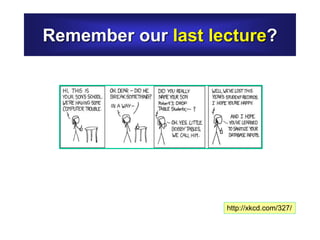



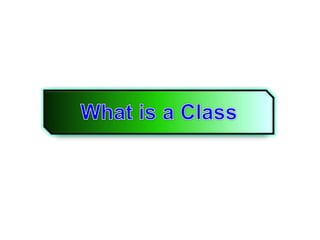


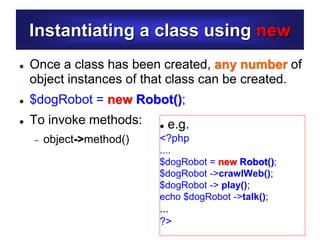




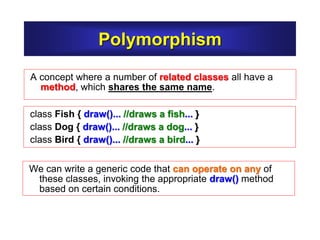

![Example: Defining classes
class ShoppingCart {
private $name; // Name of shopper
private $items; // Items in our shopping cart
public function ShoppingCart($inputname) {
$this->name = $inputname;
}
// Add $num articles of $artnr to the cart
public function addItem($artnr, $num) {
$this->items[$artnr] += $num;
}
// Take $num articles of $artnr out of the cart
public function removeItem($artnr, $num) {
if ($this->items[$artnr] > $num) {
$this->items[$artnr] -= $num;
return true;
} elseif ($this->items[$artnr] == $num) {
unset($this->items[$artnr]);
return true;
} else {
return false;
}
}
}
Let’s examine the syntax of defining a class next...](https://image.slidesharecdn.com/lecture17-php-object-orientation-220817122308-89c8cb89/85/Lecture-17-PHP-Object-Orientation-pptx-15-320.jpg)


